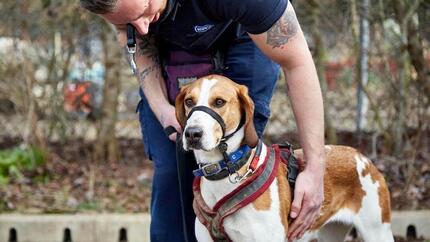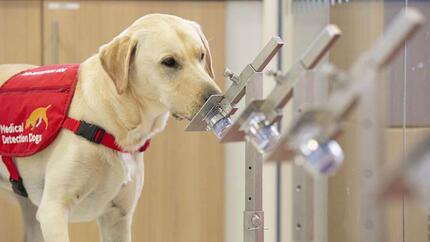One in four dogs with lockdown anxiety nothing to be sniffed at

- 49% of owners report that the last year has had an impact on their pets
- 28% report their dogs have become more anxious during this time
- Purina is raising awareness of the link between dogs’ tummies and their brains and behaviour
A survey of over 1,000 dog owners across the UK has found that nearly half believe the last year has had an impact on their pets, with over a quarter of respondents reporting their dogs have become more anxious during this time1.
With pet ownership soaring during the coronavirus pandemic, Purina PetCare is raising awareness among dog owners about the link between their pet’s tummy (gut) health and their brain and, therefore, their behaviour.
The link between the brain and the gut is widely understood and accepted in humans, with phrases such as ‘gut feeling’ and ‘butterflies in the tummy’ commonly used when we’re nervous. But it’s less well associated with our pets.
According to a recent survey by Purina, nearly 40% of dog owners were not aware that the health of their dog’s tummy can affect their behaviour1.
The influence of nutrition on anxiety in dogs is a new and exciting area of discovery that has only recently been explored. Scientists have found that the gut environment and the bacteria that are naturally found there affect brain function and behaviour,2 and a recent study conducted by Purina has identified particular healthy bacteria have a role to play in helping to reduce signs of anxiety in dogs.3
Purina is today urging owners to ensure they are feeding a good, complete and nutritionally balanced diet to maintain a healthy gut environment for their dogs, in turn helping them maintain their mental wellbeing as well as their physical health.
Actress, presenter and TV chef Lisa Faulkner is supporting the campaign to raise awareness of the positive impact of good nutrition on pets. Lisa, the dedicated owner of Rory the Miniature Schnauzer, says despite being aware of how good food can affect her own wellbeing, she was surprised to learn about how diet can be linked to her pet’s behaviour. “I know good nutrition is important for Rory’s health, but I didn’t realise the health of the bacteria in her tummy was so closely linked to her brain function. I think it’s important that owners are aware of the need to feed a good quality diet to dogs to help them have a healthy mind and a happy life.”
Purina’s survey found that now we’re resuming ‘normal’ activities, 36% of dog owners are concerned about their pet’s health and wellbeing as a result of new challenges.
However, when asked what positive steps they intend to take to help their pet adjust to the new normal and improve happiness and wellbeing, just 20% said they would reassess diet.1
More and more evidence is suggesting that gut microbes help the brain develop and function normally. We’re discovering that these tiny micro-organisms are actually very important for helping the gut communicate with the brain, and they can have real effects on behaviour.
Dr Libby Sheridan Vet and Scientific Affairs Manager for Purina in the UK & Ireland
“With more people owning pets than ever, it’s a perfect time for us to help owners understand the link between tummies, brains and, therefore, behaviour. We’re urging doggy parents everywhere to think about what they feed their pet and ensure they’re giving them a diet that is not only delicious, but also high in nutritional quality – where the diet is complete, balanced and has been developed with a deep understanding of pets’ nutritional needs. In this way, they can help support their canine companion’s gut health and mental wellbeing. It’s a simple everyday step we can take to give our pets the best day possible, every day.”
For more information about the link between gut health and behaviour in dogs and the pioneering research in this area, visit Gut brain axis | Purina Institute.
References
1Survey carried out by Opinion Matters in Oct 2021 – see ‘About the Survey’ below. 49% of owners believed the last year has had an impact on their pets, with 28% reporting their dogs have become more anxious during this time.
2Shen HH (2015). Microbes on the Mind. Proceedings of the National Academy of Sciences, 112(30): 9143-9145. DOI: 10.1073/pnas.1509590112
3Trudelle-Schwarz McGowan R (2018). Tapping into those ‘Gut Feelings’: Impact of BL999 (Bifidobacterium longum) on anxiety in dogs, ACVB Symposium 2018.
Press contact: Caroline Chambers, Companion Consultancy, Tel 07517 106679, Email caroline@companionconsultancy.com
About the survey
Opinion Matters carried out the survey of 1,005 UK dog owners on behalf of Purina Petcare during October 2021. Opinion Matters abides by and employs members of the Market Research Society which is based on the ESOMAR principles.






